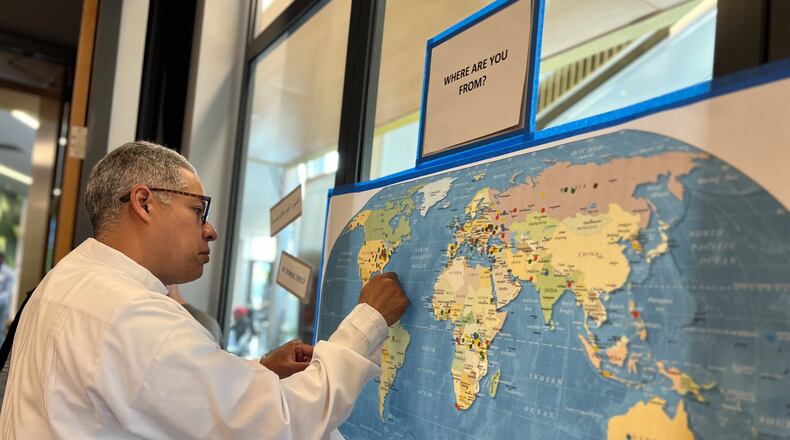“It allows the local community to learn what a refugee is, how and why they’ve come here, as well as the struggles and perseverance of coming here and building a new life,” she said.
Held at the Dayton Metro Library’s downtown branch, Saturday’s event included musical and dance performances, resources for refugees, games for children, and a meal provided by Dayton-area restaurants specializing in traditional foods from multiple countries.
Horwitz said World Refugee Day events can allow community members to see firsthand the importance of acceptance, empathy, and understanding.
“Refugees bring their background, which may be very different from yours, and the experiences they have can really enrich us ... it’s nice to have such a colorful, vibrant community,” she said. “It also shows that these individuals have families and degrees and lives just as we do.”
Selin Hussainzada is from Afghanistan. She arrived in Dayton in December 2021, one of 136 Afghan refugees who have resettled to the Dayton area with the assistance of Catholic Social Services of the Miami Valley, the Welcome Dayton initiative and a network of volunteers.
Hussainzada said she felt relief — she was now safe and out from under the harsh Taliban-led government of her home country. But she was also still reeling from the trauma of being abruptly removed from her home and her family.
“It was chaos,” she said of the experience. “My family wasn’t allowed to get into the airport.”
Hussainzada, along with her parents and brothers, had made it to the Kabul International Airport together, but Hussainzada said the lack of coordination left many people unable to make it through the checkpoint.
She was then faced with the agonizing decision to flee the country alone.
“It was not easy,” she said. “The most difficult part is that you knew your family wasn’t safe.”
Hussainzada’s family is now residing in Pakistan.
“They’re not in immediate danger right now but there are still extremist groups in Pakistan who think they are terrible, and we are an ethnic community which is the target of genocide,” she said.
Prior to the Taliban’s resurgence, Hussainzada worked as an associate attorney with Kakar Advocates, a law firm in Afghanistan, dealing with the corporate cases.
A year and a half into her journey, Hussainzada is furthering the law education she received in Afghanistan, working toward an LL.M. degree at the University of Dayton. Her goals after school include entering the U.S. military and practicing international law.
Hussainzada said she’s settling nicely into her new home in the Dayton area, despite the hardship she has experienced along the way.
“I’m still always very happy that I’d here. I’m able to do as I say; no one is telling me to stay at home or wear this or wear that,” she said. “I have my free will, my human rights, and everyone is listening to me as a human being and a part of society.”
About the Author


